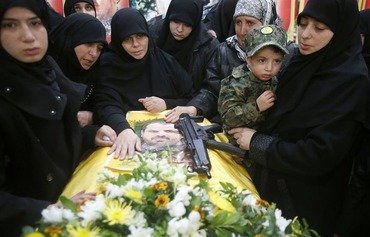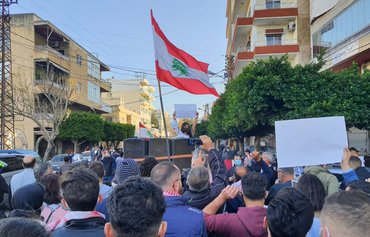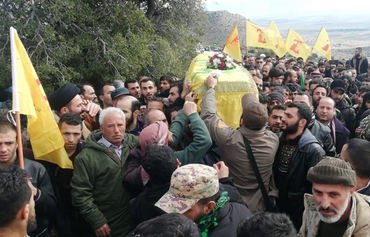Iran-backed Hizbullah has been facing increasing opposition from its members and supporters over its continued intervention in the Syrian war, analysts tell Al-Mashareq.
By early 2013, Hizbullah's first secretary-general, Subhi al-Tufaili, strongly criticised the Lebanese militia's involvement in the Syrian war, saying "Hizbullah should not be defending the criminal regime that kills its own people".
In late 2016 al-Tufaili said by intervening in Syria in support of the regime, Hizbullah is keeping extremist groups such as the "Islamic State of Iraq and the Levant" (ISIL) "at ease" and wiping out the recognised opposition "so that only the regime and ISIL remain in the arena for people to choose between".
Al-Tufaili’s comments signal the discomfort surfacing within Lebanon's Shia community, even among Hizbullah supporters, over the militia's continued intervention in a war outside the country's borders.
Internal divisions emerge
American University in Beirut professor Rami Ollaik told Al-Mashareq he served in Hizbullah’s ranks at its inception, but later broke away from the party.
Hizbullah's ruling elite controls the party's decision-making process by virtue of their association with Iran's Islamic Revolutionary Guard Corps (IRGC) , he said.
Hizbullah members and supporters "have been the victims of that elite group, footing Iran’s political bills", Ollaik said.
The party did not hesitate to intervene militarily in Syria because its convictions and calculations extend beyond Lebanon’s borders.
"It entered the war in Syria with no regard to the consequences its action would have," he said, adding that the backlash against any violent actions carried out across the border will eventually make its way back to Lebanon.
Ollaik criticised the party for putting its self-interest above all else and for blindly supporting Iran and Syria, which have provided it with funding and backing.
"The party was not fazed by the rejection of its actions by opponents from its own sect, and did not take their position into account," he said.
Unease exists within Hizbullah’s base and among its supporters, and some of it is beginning to come out into the open, journalist Ibrahim Haidar, who writes for an-Nahar newspaper, previously told Al-Mashareq.
Resentment towards Hizbullah's actions
This resentment is generally expressed by the women, he said, the wives and mothers who have lost their husbands and sons to the war in Syria .
Lebanese who reject Hizbullah’s intervention in Syria, including some within the Shia community, wonder about the point of this involvement, he added, as it is inflicting heavy losses on the party and causing youth to be killed daily.
Hizbullah silences the grieving wives and mothers with a sum of money or an apartment, and some are pushed into temporary marriages, said human rights activist Mona Fayad, a shia who has condemned the party’s involvement in the Syria war and its effects on the Shia community in Lebanon on more than one occasion.
A number of these women are upset "because they are forced to be silent and unable to express their anger out loud because they need the financial and economic support", she said.
Hizbullah exploits the feelings of those who have suffered oppression and marginalisation for long periods of time, and instills fear with its use of force, which makes party members reluctant to speak out against its actions, Ollaik said.
"There is no argument or debate, only actions driven by obedience," Ollaik said of Hizbullah.
"Under all that excessive show of force, there is a fire that burns slowly, and the only people who see it and comprehend its magnitude are party members [...] who know that divorce is inevitable, even if after a while, between the party’s ruling elite and its base," he said.
Characteristic power struggles
Hizbullah, like other extremist groups fighting in Syria, has been plagued by internal divisions and doctrinal disputes, analysts say.
The cracks that have begun to emerge within the party's ranks, can also be seen within and among other armed groups involved in the Syria war, as evidenced by the well-documented rift between ISIL and al-Nusra Front (ANF), now known as Fatah al-Sham Front .
Internal disputes within extremist groups are nothing new, journalist Hazem al-Amin told Al-Mashareq, adding that "the most extreme form of violence is the one they inflict on each other".
These disputes are typically fueled by power struggles, he said, adding that every camp begins "liquidating those who oppose it" among its own members.
There are a number of reasons why conflicts arise between extremist groups of the same sect, said Qassim Qasir, a political writer who specialises in extremist groups.
Some of the disputes are doctrinal, he told Al-Mashareq, in that each group has its own vision and jurisprudence and thus believes it has the right to demand the allegiance of others.
"Thus, anyone who does not follow its vision becomes an enemy," he said, adding that internal disputes could lead to "one group splitting into two groups".
"Power struggle is the main causal factor" in such conflicts, Qasir said, adding that "every group seeks to monopolize power and subjugate others to its will".
Other factors that divide groups and fuel internal conflict relate to the acquisition of wealth, he said, as well as "personal disputes between the leaders".
In these cases, Qasir said, "the groups’ own affiliations with external groups or parties that have their own conflicting demands and interests would be a key factor in the conflicts that arise among brothers".

![Supporters of Lebanon's Hizbullah attend the November 5th funeral of a fighter killed in combat in Syria alongside regime forces in a southern suburb of Beirut. [Stringer/AFP]](/cnmi_am/images/2017/01/25/7073-Lebanon-Hizbullah-funeral-600_384.jpg)







Just shut up! If Bashar al-Assad had trusted Iran and Hezbollah, he wouldn’t have called on the Russians. The Syrian army doesn’t trust Hezbollah or Iran, and that was why the Russians came in to tread on Hezbollah and have the upper hand. Hezbollah are animals who came to Syria to be slaughtered.
Reply4 Comment(s)
Unfortunately, the topic is not based on tangible facts, and most of the talk is wrong, like any other information.
Reply4 Comment(s)
You’re all lies and hypocrisy! You’re like barking dogs! The [Hezbollah] party is to blame for letting such people bark. You want to have greatness without doing anything! Just keep your mouths shut!
ReplyThese obscene words are an indication of your culture.
Reply4 Comment(s)